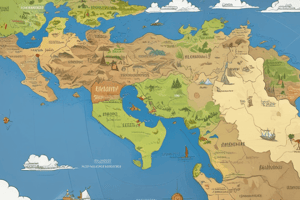Podcast
Questions and Answers
What is the primary focus of physical geography?
What is the primary focus of physical geography?
- Investigating Earth's ecosystems and surface features (correct)
- Exploring settlement patterns
- Analyzing urban areas
- Studying human societies
How does climatic geography differ from physical geography?
How does climatic geography differ from physical geography?
- By examining spatial climate variations due to altitude and latitude (correct)
- By exploring urban characteristics
- By focusing on human interactions with the environment
- By studying the distribution of plants and animals
What aspect of human society does environmental geography primarily study?
What aspect of human society does environmental geography primarily study?
- Formation of Earth's features
- Cultural interactions
- Transportation networks
- Economic activities (correct)
In what way does political geography differ from urban geography?
In what way does political geography differ from urban geography?
What is the main difference between human geography and physical geography?
What is the main difference between human geography and physical geography?
What is the primary focus of environmental geography?
What is the primary focus of environmental geography?
Which technology is used in remote sensing for data collection in geography?
Which technology is used in remote sensing for data collection in geography?
What is the main purpose of GIS technology in geography?
What is the main purpose of GIS technology in geography?
In regional geography, what does investigating regional disparities primarily focus on?
In regional geography, what does investigating regional disparities primarily focus on?
Why do many geographers emphasize understanding local conditions in addition to global perspectives?
Why do many geographers emphasize understanding local conditions in addition to global perspectives?
Study Notes
Geography is the study of Earth's landscapes, environments, and human societies. It encompasses various disciplines such as physical geography, which focuses on the natural world; human geography, which studies how humans interact with their environment and influence it; and environmental geography, which looks at the relationship between people and nature. There are different branches within these broad categories, including climatic geography, political geography, urban geography, landscape geometry, and regional geography.
Physical geography deals with the formation and development of Earth's surface features, atmosphere, oceans, and ecosystems. It includes studying the distribution of plants, animals, rocks, soils, water, and climate over the earth's surface. Climatic geography is closely related to this field, looking specifically at the spatial variations of climate due to factors like altitude, latitude, and landform.
Human geography deals more directly with how human societies shape and affect their surroundings, including settlement patterns, economic activities, transportation networks, and cultural interactions. Political geography falls under this umbrella, examining the spatial relationships among countries, regions, cities, and other administrative units. Urban geography is another branch, focusing on the characteristics of urban areas and the forces shaping them.
Environmental geography combines elements from both physical and human geography by exploring the connections between people and their environment. This can involve analyzing population density, resource consumption, waste disposal, pollution, and land use. Regional geography, also known as economic geography, investigates regional disparities in terms of wealth, power, and well-being across different parts of the globe.
In addition to these traditional fields, there has been growing interest in applying advanced technologies to geographic research. For example, remote sensing uses satellites and drones to gather data on everything from land cover to ocean temperatures. GIS (geographical information systems) technology allows researchers to capture, store, analyze, and display geographical data in digital form, providing powerful tools for mapping and visualizing complex patterns and processes.
While geography often involves large scales and global perspectives, it can also be studied at smaller scales such as neighborhoods or individual communities. In fact, many geographers argue that understanding local conditions is crucial for making sense of broader trends and phenomena. Overall, geography offers valuable insights into how our planet functions and how human actions impact its diverse environments, now and in the future.
Studying That Suits You
Use AI to generate personalized quizzes and flashcards to suit your learning preferences.
Description
Learn about the various disciplines within geography, including physical geography, human geography, and environmental geography, along with their respective branches such as climatic geography, political geography, and urban geography. Discover how geography encompasses the study of Earth's landscapes, environments, and human societies.




